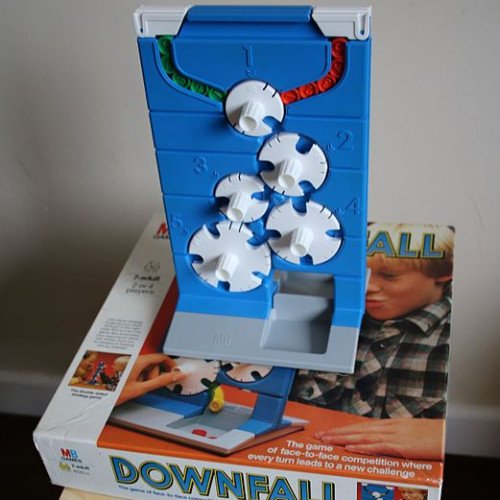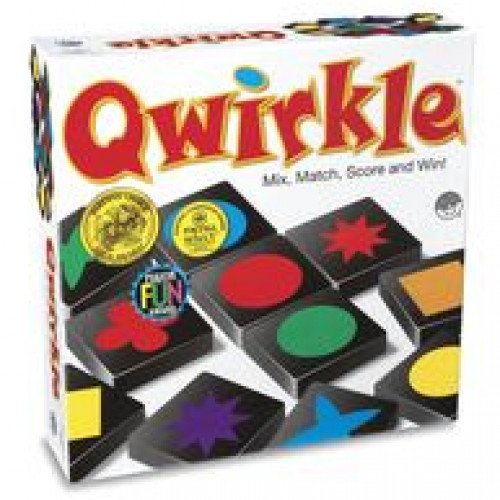DOWNFALL VS QWIRKLE

DOWNFALL
Downfall is a two-player game for players aged 7 and older, first marketed by the Milton Bradley Company in 1970. The game consists of a vertical board with five slotted dials on each side. Each player starts with ten numbered tokens or discs at the top of the board. The object of the game is to move the discs to the bottom of the board by turning the dials. Players alternate turns moving the dials and cannot move a dial that their opponent has just moved. The winner is the first player to move all of their discs into the tray at the bottom. An advanced version of the rules dictates that the discs arrive in the tray in numerical order. Since neither player can see the other's board, it is common to inadvertently advance - or hinder - the opponent's gameplay. The game rewards forward thinking and planning; players may try to "trap" their opponent into turning a dial that will advance their own disc, while trying to ensure that their own discs are not caught and dropped out of order. The game is currently available in the UK under the name New Downfall, manufactured and marketed by Hasbro. The new version follows the same rules but has a more futuristic design in red and yellow. The game's box art is parodied on the cover of Expert Knob Twiddlers, an album by Mike & Rich (Mike Paradinas & Richard D. James).
Statistics for this Xoptio

QWIRKLE
Qwirkle is a tile-based game for two to four players, designed by Susan McKinley Ross and published by MindWare. Qwirkle shares some characteristics with the games Rummikub and Scrabble. It is distributed in Canada by game and puzzle company Outset Media. Qwirkle is considered by MindWare to be its most awarded game of all time. In 2011, Qwirkle won the Spiel des Jahres, widely considered the most prestigious award in the board and card game industry. A sequel, Qwirkle Cubes, was released by Mindware in 2009. Qwirkle comes with 108 wooden tiles, and each tile is painted with one of six shapes (clover, four-point star, eight-point star, square, circle and diamond) in one of six colors (red, orange, yellow, green, blue and purple). The box also contains a bag to store the tiles and a rule book. The game begins with all the tiles being placed in the bag and mixed thoroughly. Each player then randomly draws six tiles. During their turn, a player may either: place one or several tiles on the table; or instead of playing tiles, exchange one or more tiles in their hand for other random tiles. In general, any tiles that are placed in a row must share one attribute (either color or shape), and they must be played in one line, although they do not need to touch other tiles being placed in that turn. A player must always end a turn with six tiles, so, if they place tiles during a turn, they draw random tiles to build their hand back up to six. Play continues until one person uses all of their available tiles and there are no more tiles to be drawn.